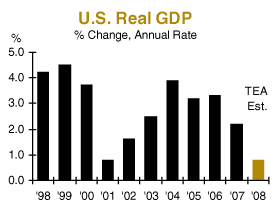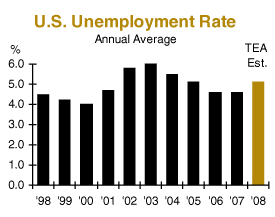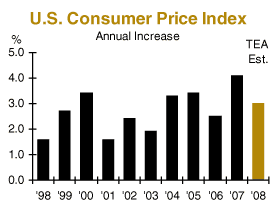|
March 19, 2008
Springtime Outlook
Written by Jeff Thredgold, CSP, President, Thredgold Economic Associates
The American Economy
…the “R” word?
What a mess! A combination of weak U.S. housing markets, constant negativity from the national media, domestic and global credit markets in widespread disarray, oil over $100 per barrel and a volatile stock market is not exactly a solid foundation for U.S. economic growth. A mild recession seems underway.
 Better news suggests that the combination of aggressive Federal Reserve ease, a $168 billion fiscal stimulus program (with more likely to come from a spend-happy Congress), and solid global economic growth should help to minimize both the duration and depth of the likely recession. We expect modest U.S. economic growth to return later in 2008. Better news suggests that the combination of aggressive Federal Reserve ease, a $168 billion fiscal stimulus program (with more likely to come from a spend-happy Congress), and solid global economic growth should help to minimize both the duration and depth of the likely recession. We expect modest U.S. economic growth to return later in 2008.
The Federal Budget
…more borrowed money
Good news? A budget deficit of $162 billion was recorded in fiscal year (FY) 2007, which ended on September 30, 2007. That deficit was the smallest in five years. Bad news? A menu of weak U.S. economic growth (or recession), war spending, and Congressional fiscal stimulus could see the deficit in FY 2008 approach $400 billion, or more than $1 billion daily.
Employment
…long-term issue
Extremely weak job creation in coming months (at best) should lead the nation’s unemployment rate towards 5.2%-5.4%. By comparison, the jobless rate averaged 4.6% in both 2006 and 2007. Longer-term labor shortages will remain, however, as the nation’s labor force is expected to grow at less than 1.0% annually over the next 20 years.
 Inflation Inflation
…oil and food
Record oil prices, climbing commodity values, and rising food costs have pushed inflation pressures higher. The 4.1% rise in the Consumer Price Index in 2007 was the largest rise since 1990. We expect the CPI to rise roughly 3.0% in 2008.
Note that a measurable decline in oil prices later this year would unwind much of the inflation pressures that have developed. We still see inflation pressures under control in coming years.
The Federal Reserve
…an aggressive posture
The Federal Reserve cut its important federal funds rate six times by a total of 3.00% between 9/18/07 and 3/18/08, with the rate falling to 2.25%. Such aggressive monetary ease ranks with any comparable period in the Fed’s 95-year history.
If the economy stabilizes, the Fed will soon move to the sidelines. If the presumed recession gets worse, or global credit markets remain in a state of flux, a federal funds rate near 1.50% could be in the cards. The Fed will also continue to provide enormous amounts of financial market liquidity behind the scenes.
Long-Term Interest Rates
 …it’s always somethin’ …it’s always somethin’
With many nervous global investors buying only the highest quality, most marketable investments, the yields (or returns) on U.S. Treasury bills, notes, and bonds are extremely low. Such low yields would typically lead long-term fixed-rate mortgage rates lower…but not this time.
Home Prices
…what goes around…
Many builders, homeowners, and investors during 2003 to 2006 got carried away with expectations of higher and higher home prices, a development followed by one of the most painful real estate corrections ever now underway. Home prices, which largely doubled in California, the Southwest, and in Florida during those four years, are now down sharply, with likely additional weakness through the end of the year. National delinquencies and foreclosures are at or near record levels, with much of the problem in the areas noted above.
The Global Economy
…still flying high
Solid global economic growth continues, although most forecasts have been revised lower in recent months, tied to high levels of credit market anxiety. Still, global growth exceeding a 4.0% real annual rate in 2008 would be the sixth year in a row of strong performance.
Japan struggles with soft economic growth likely to weaken even further as a result of the yen’s rise against the dollar. The Japanese anxiously look over their collective shoulders as China gains in Asian and global influence. Impressive Indian economic growth remains on track, led by solid domestic demand for goods and services. Major Indian infrastructure challenges need to be met sooner rather than later.
Even as the Chinese political leadership takes additional steps to slow the economy, growth simply remains too strong. Of critical importance in ’08? Staging a successful Beijing Olympic Games. The highly emotional issue regarding the quality and safety of goods “Made in China” will be center stage in the U.S. for years to come, with many American consumers simply refusing to buy. China suffers from serious environmental damage, with polluted air in major cities and poisoned rivers the norm.
Life is good for Europeans traveling to the U.S. as tourists and shoppers. European exporters, however, are sweating bullets as their products become more and more expensive in the U.S. European hotels, restaurants, museums, etc. seeking large numbers of visitors from the U.S. this summer are keeping their fingers crossed. Necessary labor reforms bode well for greater European competitiveness in coming years, particularly in Germany.
Russian President-elect Medvedev and soon-to-be Prime Minister Putin will have an interesting relationship in coming months as both build power bases. A Russian government with two leaders hasn’t been in place since dinosaurs ruled the Earth. Could it get nasty at some point? For the moment, both Putin and his puppet Medvedev enjoy widespread support as enormous oil revenues have boosted the standard of living of millions of citizens.
Various South American countries struggle with high taxes and stifling regulatory burdens. Brazilian economic growth is solid, led by a “growing” agricultural sector. Venezuela? A land of oil field negligence, widespread corruption, bribery, poverty, and saber-rattling against certain neighbors and the U.S.
Canadian economic growth has been sluggish, although joblessness is at a 33-year low. While impressive in land mass, Canada’s 33 million people match those living in metropolitan Tokyo. The Mexican economy is growing at a reasonable pace, with the immigration issue highly charged on both sides of the Rio Grande. Cuba? Expect greater freedoms as Fidel’s brother runs the show.
The Bottom Line?
U.S. economic performance will be sickly in coming months before (hopefully) improving later this year and in ’09. In addition, we expect: a much larger budget deficit…rising near-term unemployment…lesser inflation pressures…declining short-term interest rates, with volatile long-term rates…soft housing markets…and an anxious global economy.
Email this article to a friend
|
|
Subscribe to the Tea Leaf
Like what you just read? Have Jeff Thredgold’s Tea Leaf emailed to you free each week. Subscribe today.
|
|
|

“Tea”ser
When confused remember…everyone seems normal until you get to know them.
Send us a “Tea”ser of your own.

“Tea”stimonial
“The attendees were captivated and wanted more! Your distinctive blend of humor and facts, insights and fun made it one of our best sessions. Your passion for economics—and making it real—is what distinguishes you from the rest.”
—Lydia Thurston, Senior Consultant, FCCServices, Inc.
More testimonials
Invite Jeff Thredgold to speak at your next conference, meeting, or client function
If you like the Tea Leaf, you’ll love Jeff Thredgold’s live presentations. Jeff takes your audience on a timely, engaging, and entertaining tour of the U.S. economy and financial markets. Debunking some of today’s most common economic myths, he offers a clear picture of how the American economy is really performing and what that means for the future of your finances.
|

